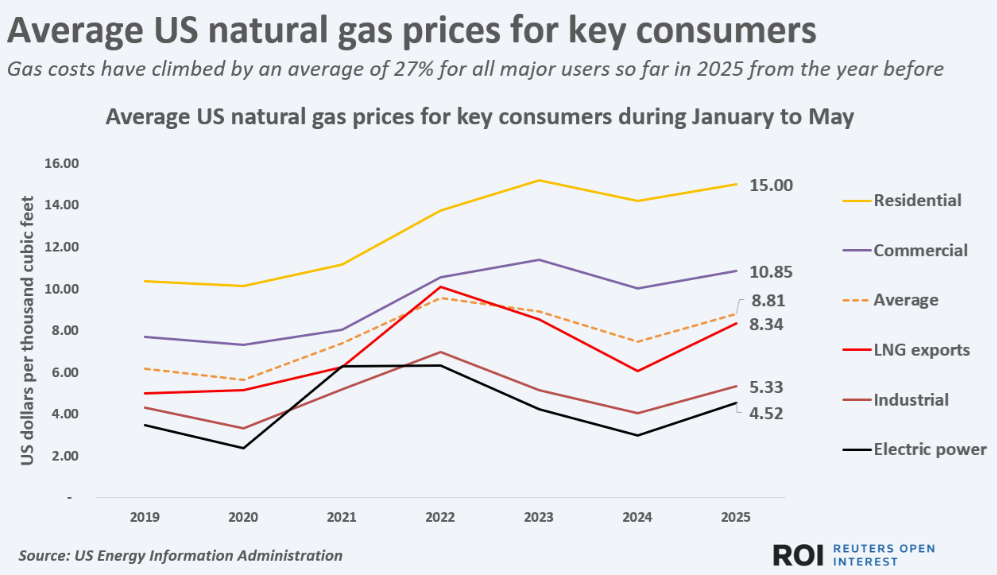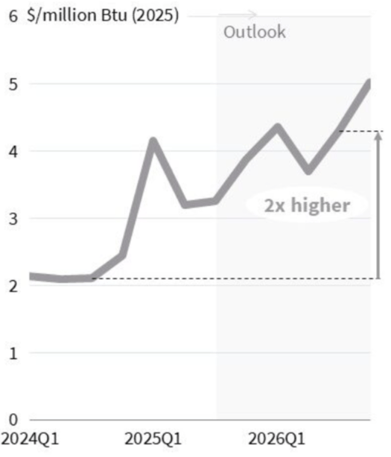This blog is about the rising cost of natural gas. We hope that it reaches those who blamed this past winter’s rising cost of gas on the cost of energy efficiency programs.
Let’s start with this graph, courtesy of Reuters, showing that the price of natural gas has risen almost 50% nationally in the last few years for residential consumers.

As Gavin Maguire of Reuters points out, a major factor in the price increase for gas has been the surge in the amount of liquified natural gas (LNG) exported from the United States to countries all over the world – particularly European countries seeking to become less dependent upon Russian gas for their homes and industries.
“All told, Europe's imports of U.S. LNG from January through August are up 61% compared to the first eight months of 2024.” Asian countries have also looked to LNG to fuel their growing economies.
Maguire goes on to say, “even if gas demand from offices and homes continues to decline, sustained strength in U.S. LNG exports has the potential to set the tone for the overall U.S. domestic gas market, and could keep prices trending higher.”
In other words, Americans are exposed to the fact that LNG is priced on the world market. Because LNG can be shipped all over the world, the price is set by the highest bidders – whether they speak Dutch or Japanese.
Maguire’s viewpoint is now conventional wisdom. The federal Energy Information Administration forecasts that continued LNG exports are the main reason that gas supply costs in 2026 are forecasted to be double what they were in 2024.


Our friends at RMI show this graphically.
Caveat: Fossil fuel prices are inherently volatile. This projection is probably directionally valid, but we expect deviations from the path along the way.
Rising LNG exports might be good for big gas producers – the frackinvestors. Not workers so much, mind you. As Brendan Slotterback posted on Blue Sky:
“Appalachia produces more gas than anywhere in the US outside of Texas. But the streets of PA, OH, and WV are not paved in gold. Quite the contrary, by common measures of community health - jobs, wages, population - extracting fossils provides no benefit.”
For more on that, read this story from Canary Media.
Rising LNG exports might also be good for some buyers in Europe and Asia who cannot find something cheaper. But for New Englanders there’s a better, cleaner, affordable alternative that allows households to break free from these global price swings: heat pumps.
Heat Pump Rates Are Making Clean Heating More Affordable
Furthermore, gas supply is not the only factor driving up heating bills. We have written that in Massachusetts and Rhode Island, the cost of maintaining the gas infrastructure also keeps rising. And this trend will likely accelerate as customers defect from the “gas grid” in favor of high-efficiency cold-climate heat pumps, heat pump water heaters, induction stoves, and electric clothes dryers. What once was true – that home heating was cheaper with gas than heat pumps – is rapidly becoming false. Regulators in Massachusetts have just approved wintertime electricity rate reductions for customers with heat pumps. A recent report, sponsored in part by Green Energy Consumers Alliance, found that 64% of homes could reduce their heating bills by installing cold-climate air-source heat pumps and enrolling in the newly approved heat pump rate. At the same time, the Department of Public Utilities is investigating even stronger heat pump rates in Docket 25-08, in response to a petition from the Department of Energy Resources, which could allow 82% of homes statewide to save by making the switch.
And it’s not just about cost. LNG is bad for the planet. Recent studies show that emissions from LNG could be as bad as from coal, thanks to all the energy required to liquefy and vaporize it from well to end-use. Here’s an article from Scientific American.

The Bottom Line
For Massachusetts residents, rising gas prices don’t have to mean higher heating bills. With seasonal heat pump rates, heat pump owners can enjoy clean, efficient, and affordable heating – no matter what happens in the gas market.




Comments